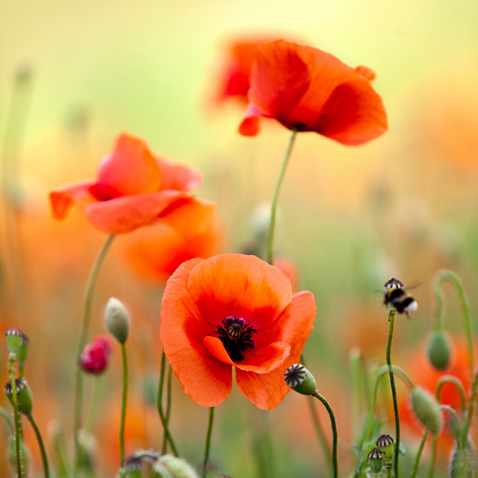
Corn poppy
Scientific names: Papaver rhoeas
Family: Papaveraceae
Alternate names: Amapola, Common Poppy, Copperose, Coquelicot, Corn Rose, Cup-Puppy, Field Poppy, Flanders Poppy, Grand Coquelicot, Headache, Headwark, Lalpost, Pavot Coquelicot, Pavot des Moissons, Pavot Rouge, Ponceau, Rakta Khakasa, Rakta Posta, Rakta-Posta, Red Poppy, Rhoeados Flos, Shirley Poppy
Actions: Antioxidant activity, Antiulcerogenic, Iron-chelating activity, Morphine dependence, Sedative
Background
Corn poppy (Papaver rhoeas) is a plant with bright red flowers. The dried flower petals are used in foods in the Mediterranean, and also as medicine.
Corn poppy flower petals contain chemicals that can cause sleepiness. They can also have antioxidant effects. The petals also contain minerals, including potassium, zinc, copper, and iron.
People use corn poppy for cough, insomnia, pain, withdrawal from heroin, morphine, and other opioid drugs, and other purposes, but there is no good scientific evidence to support these uses.
Don't confuse corn poppy with poppy seed or California poppy. These are not the same.
Corn poppy flower petals contain chemicals that can cause sleepiness. They can also have antioxidant effects. The petals also contain minerals, including potassium, zinc, copper, and iron.
People use corn poppy for cough, insomnia, pain, withdrawal from heroin, morphine, and other opioid drugs, and other purposes, but there is no good scientific evidence to support these uses.
Don't confuse corn poppy with poppy seed or California poppy. These are not the same.
Safety Safety definitions
When taken by mouth: Dried corn poppy flower petals are possibly safe. But consuming large amounts of corn poppy flower petals (over 250 grams) is possibly unsafe. Large amounts might cause nausea, vomiting, seizures, changes in heartbeat, and fainting.
Children: The FRESH leaves and blossoms of corn poppy are possibly unsafe when taken by mouth in children. They might cause side effects such as vomiting and stomach pain. There isn't enough reliable information to know if DRIED corn poppy flowers are safe for children.
Special Precautions & Warnings:
Pregnancy and breast-feeding: There isn't enough reliable information to know if corn poppy is safe to use when pregnant or breast-feeding. Stay on the safe side and avoid use.Children: The FRESH leaves and blossoms of corn poppy are possibly unsafe when taken by mouth in children. They might cause side effects such as vomiting and stomach pain. There isn't enough reliable information to know if DRIED corn poppy flowers are safe for children.
Effectiveness
Effective Effectiveness definitions
There is interest in using corn poppy for a number of purposes, but there isn't enough reliable information to say whether it might be helpful.
Dosing & administration
There isn't enough reliable information to know what an appropriate dose of corn poppy might be. Keep in mind that natural products are not always necessarily safe and dosages can be important. Be sure to follow relevant directions on product labels and consult a healthcare professional before using.
Interactions with pharmaceuticals
Sedative medications (CNS depressants)
Interaction Rating=Moderate Be cautious with this combination.
Corn poppy might cause sleepiness and slowed breathing. Some medications, called sedatives, can also cause sleepiness and slowed breathing. Taking corn poppy with sedative medications might cause breathing problems and/or too much sleepiness.
Interactions with herbs & supplements
Herbs and supplements with sedative properties: Corn poppy might cause sleepiness and slowed breathing. Taking it along with other supplements with similar effects might cause too much sleepiness and/or slowed breathing in some people. Examples of supplements with this effect include hops, kava, L-tryptophan, melatonin, and valerian.
Interactions with foods
There are no known interactions with foods.
vital.ly has licensed monographs from TRC Healthcare.
This monograph was last reviewed on 19/03/2022 04:33:33 and last updated on 21/11/2014 23:15:26. Monographs are reviewed and/or updated multiple times per month and at least once per year.
Natural Medicines disclaims any responsibility related to medical consequences of using any medical product. Effort is made to ensure that the information contained in this monograph is accurate at the time it was published. Consumers and medical professionals who consult this monograph are cautioned that any medical or product related decision is the sole responsibility of the consumer and/or the health care professional. A legal License Agreement sets limitations on downloading, storing, or printing content from this Database. No reproduction of this monograph or any content from this Database is permitted without written permission from the publisher. It is unlawful to download, store, or distribute content from this site.




